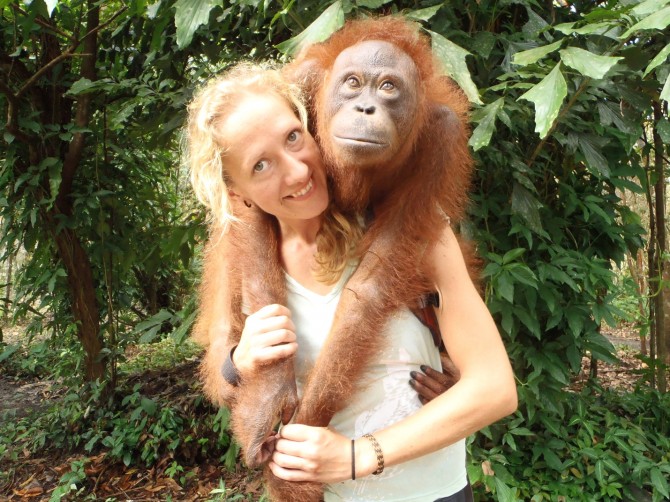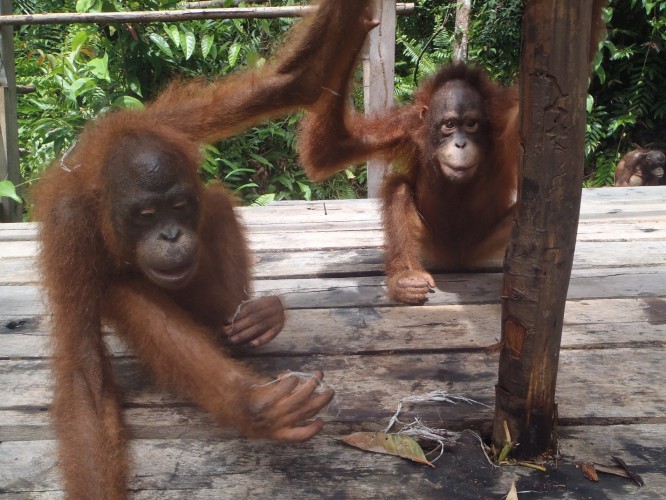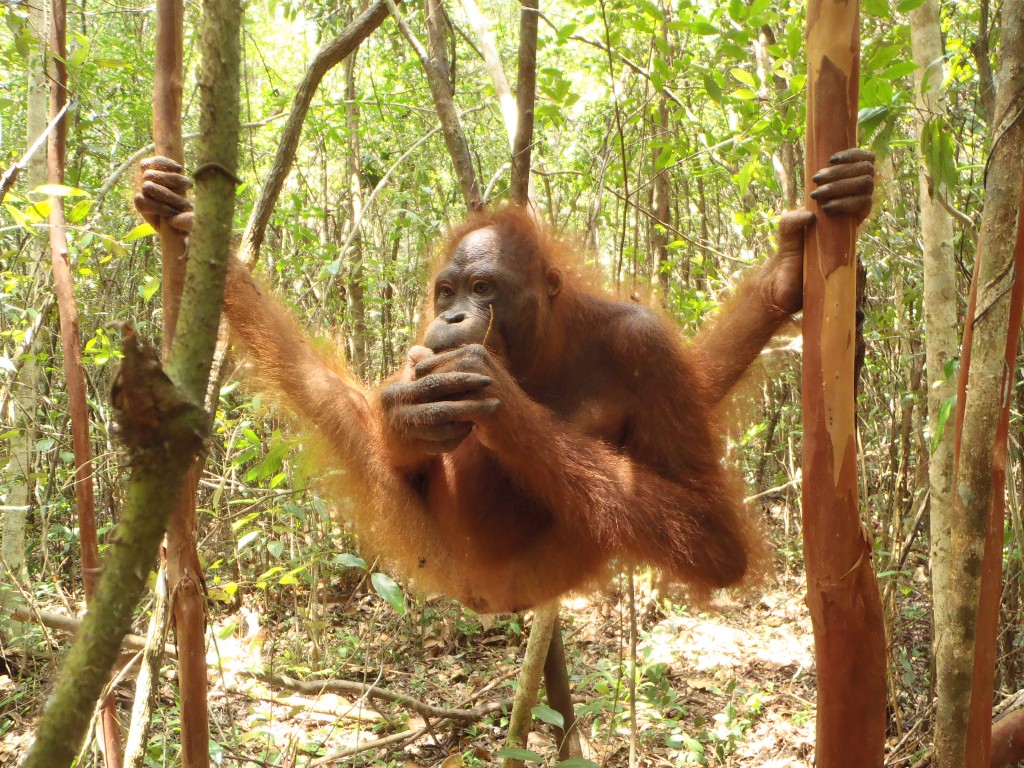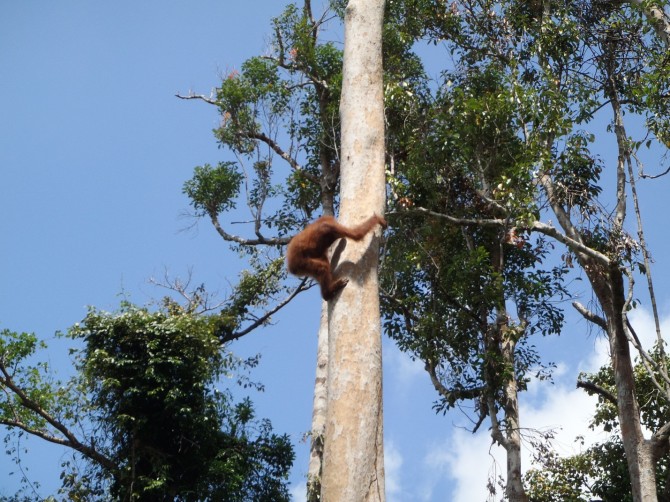I had the wonderful opportunity to work with OFI as a ‘forest release’ intern for six months this past year at the Orangutan Care Center and Quarantine (OCCQ) in Central Indonesian Borneo. It was my first time working with orangutans and I didn’t know how I would connect with them. My first four weeks at the Care Center were spent learning to speak Indonesian and spending time with orangutans while they were in their sleeping enclosures – observing their behaviour and personalities, learning their habits, and getting them used to me. Of all of them, Maxine was the one I bonded with first.
When I first met Maxine she was occupying a small enclosure by herself. Before that time, her roommates were four larger females who were stealing her food. She became very thin, so the Care Center staff moved her to her own sleeping enclosure. In her own space she could eat peacefully and slowly, which is her style. I sat next to her enclosure and gave her enrichment every day for weeks. In that period I discovered how smart she really is.
Maxine has an amazing ability to communicate very clearly. She would take my hands off the bars of her enclosure, physically rotate me around, and then push me in the direction of something she wanted. I found myself constantly picking the hibiscus flowers she loves. She also loves milk. Because she was under weight, she was given milk each morning. She would often keep the milk bottle, then later in the day hand it to me and push me in the direction from which the milk usually comes. When she started putting my hands on the lock of her sleeping cage, I realized it was time for me to take her to the forest.
The Care Center staff told me many stories about Maxine’s behaviour in the forest. They said she usually goes out far into the forest and doesn’t come back to anyone easily. Anytime they take her out, someone always has to get Ibu Tuti (the lady at the Care Center who gives her milk) to bring her some rice and coax Maxine down from the trees. If she doesn’t come back before nightfall, someone has to sleep in the forest and bring her home in the morning.
Maxine is smart, they said. She will try to get food from you when you’re not looking. After hearing all these stories, I was more determined than ever to open her cage and work with her.
Attempt #2
On our first day out, I carried Maxine on my back to the forest, walking out with OFI staff members and other orangutans. I followed Maxine through the forest and got bit by the red ants she was eating. I learned quickly not to follow her too closely, since biting ants fall from the trees like rain when orangutans are climbing and shaking the branches. On our first two outings, Maxine headed in the same direction both times in her search for the tasty (to her) red ants. Maxine enjoyed her forest time so much that when it got late in the day, I had to call one of the female staff members to prepare Maxine a nice rice dish to convince her to come down. She eventually came down and climbed on my back. I wondered if she would ever come down of her own accord.
Attempt #3
I followed Maxine through the forest with Pak Ipin, an OFI staff member who knows the forest very well. We followed her with her orangutan friend Berman and watched Maxine eat her fill of ants. Berman, Pak Ipin, and I got plenty of ant bites. So many, in fact, that Berman (who didn’t like the ants), left to join the other orangutans. Even Maxine eventually got tired of the ants and came down to the ground, at which point Pak Ipin quickly, but gently, caught her by the arm so we could take her back. We sat with her a few minutes, gave her some treats, and I carried her home on my back… all through dense, hot, wet forest.
Attempt #4
After getting permission to take Maxine out by myself, I came armed with rice, treats and milk. I must admit I was nervous as I opened the sleeping enclosure and took her out on my back. I followed her, once again, to her favorite red ant territory in the forest. Everything was going great until a wind started to blow, and dark clouds rapidly approached. Maxine came down after only an hour and looked at me as if to say “we should go back now; where’s my rice?” However, since I didn’t offer her any, she quickly walked right back into the forest and left me tangled in some vines. I lost her!!! I searched and panicked for what seemed like forever (It was probably only 20 minutes). Finally, I called two other volunteers to help me search. It poured rain while we walked and called for about 30 minutes. Finally, the rain stopped. We kept calling Maxine’s name and within five minutes she came crashing through the trees behind us. I pulled out her rice and she readily jumped on my back. It seemed like she was happy to see us too. Ultimate relief!!!
Attempt #5
This time, I took Maxine out with her friend Berman with the intention of staying in one spot and calling her. I wanted to see if Maxine would come back to me on her own. Always foraging, she ate some fruit in the trees around me for about 30 minutes then took off in her usual direction. I played with Berman and kept calling Maxine’s name every few minutes. Eventually Berman got hungry so another care-giver took her home to eat while I continued to wait for Maxine. I waited for a little while and once again started to panic. Staff and volunteers always get anxious when an orangutan is out of sight or hearing range for too long. There are roads and powerlines on the borders of our rehabilitation forest which can be dangerous for young animals. I decided, after 40 stressful minutes, to go into the forest to look for her. After a few minutes of calling and walking towards ‘her favorite spot’, Maxine finally came to me. I gave her the rice she loves and she climbed on my back.

Attempt #6
This time, encouraged by my recent progress and developing relationship with Maxine, I took out Maxine and Berman together again, this time determined not to panic. A couple of other staff joined me. Today, Maxine stayed around much longer, and even came over for a drink of water before she disappeared for her foraging, climbing and exploration. I called and called every few minutes to make sure she knew where we were. Around 12 noon, we heard crashing. Maxine came back on her own!!! Overjoyed, I offered her the rice. She compliantly climbed on my back, and I kissed her cheek. Reflecting on her progress that night, I started noticing a repetitive behaviour in her over these past six outings. She was more willing to come back when there weren’t many people around, men in particular. I wondered if she had a bad experience with a man in the past.
Attempt #7
In what was becoming a pleasant routine, another volunteer and I took Berman and Maxine out together again. Maxine stayed close to us for a long time and played with Berman. While this is typical for many young females, this was the first time I’ve seen Maxine (who is quiet and independent) play with another orangutan. They played together for at least an hour, wrestling, biting, and playing what seems like ‘forest tag’ chasing each other through the trees. She then left for a while to explore on her own. I called as usual; she came back before noon, which was early for her!

Attempt #8
Today, local staff members came out with five adolescent females to join Maxine, Berman, a volunteer, and me in the release forest. Maxine stayed close to us for the first few hours. She then went to her ‘favourite ant spot’ with Berman and two other orangutans. I followed with a staff member. Becoming unusually social, she played and played with the other orangutans, ate ants and fruit, and came over to me for a drink of water twice. The group split up, Pak Deri (an OFI care-giver) followed Maxine and Sally, and I stayed with Berman and another orangutan. Eventually we caught up to them again. I called Maxine’s name to see if she’d show herself. She came over, climbed down from the tree, and climbed into my arms. Pak Deri gave me a look of surprise. He had never seen her do that before. After a brief cuddle, she found her usual spot on my back and held on. I nearly cried. I felt like she finally trusted me.
I continued to take Maxine out throughout the rest of my internship. Her behaviour changed significantly. She played with many other young female orangutans; she even played with some of the male volunteers and care center release staff! A few times, when it was time to go home, she climbed on the back of another person instead of me. I felt she was finally starting to feel safe and comfortable. Perhaps orangutans can sense a person’s intentions. She started to let me know when she got hungry by tapping on my treat bag. Instead of being in the trees all the time, she would come down and play in water, giving herself a little bath from time to time.
After a few months, I learned how to find termite nests under the forest floor. After watching me a few times, Maxine began mimicking me, and started digging around tree bases, finding her own nests. Termites are a rich source of protein and Maxine would eat them methodically, making sure almost none fell on the ground.

A few weeks before I left the Care Center Maxine and I had our ultimate test together in the forest. We were in an area I wasn’t very familiar with and (as it often happens during the rainy season), large clouds rolled in so quickly I had no time to really consider where we were. The raindrops started falling hard and fast. She quickly climbed on my back so I could take her home. The rain was so loud I couldn’t hear any noise from the care center staff. Even the sounds of the call to prayer from nearby mosques were drowned out. I was beginning to get worried. We were walking through dense bush and I was cut and bruised from trying to clear a path. Maxine got off my back and found a bit of shelter under a tree while I looked for a familiar path. I had only walked a few steps out of her line of vision when I heard her cry so hard and so loud that it shook my soul. I went to her immediately and she climbed up into my arms and held on tight. Did she think I had abandoned her? After a few more minutes of stressful searching, I found the way out. Walking home with Maxine on my back, I felt hot tears stream down my face. She had cried for me as baby orangutans cry for their moms if they are too far away. The truth is, if I could stay, be her mom and protect her, I would. I’ve been through some hard situations in my life, and leaving Maxine was one of the hardest . I hope to return one day, though I wonder if she will remember me.

My experience with Maxine gave me confidence to work with several other adolescent orangutans who needed special, personalized attention. I hope she is one of the lucky orangutans who will soon get released in the near future. She has the forest skills and smarts to survive on her own.
It’s been over six months since I returned to Canada from Borneo, but there isn’t a day that goes by that I don’t think about Maxine. The experience changed me forever. I can no longer buy products with palm oil or wood products from Indonesia as the illegal pet trade still exists there, primarily as a consequence of illegal logging and the widespread clear-cutting to establish palm oil plantations. Maxine and so many other orangutans in captivity need a forest home. Please join us in protecting it.